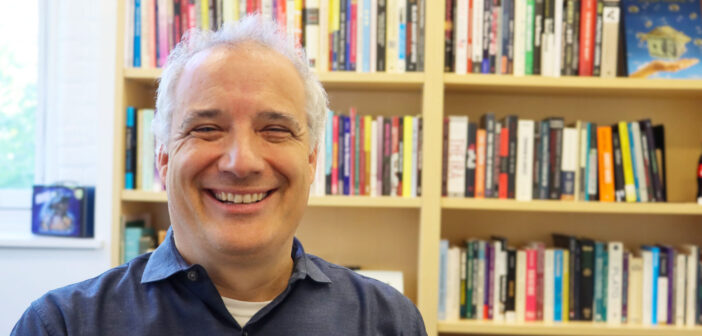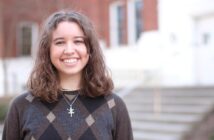This is a story about free expression at Lehigh. But to tell it, I need to start someplace much different.
Birmingham, Alabama, 1963.
The Southern Christian Leadership Conference (SCLC), led by Martin Luther King Jr., applied for a permit to lead a demonstration against racial segregation in the city.
The permit was denied, as they always were for civil rights events. But Dr. King and over a thousand activists marched anyway, peacefully walking from the Sixth Avenue Zion Hill Church toward the Birmingham City Hall. As they approached, King and dozens of others were arrested for “parading without a permit.”
This, of course, wasn’t an isolated event. Authorities frequently used small, technical violations of the law — like parading without a permit — to fight against expressions of support for racial equality that the white majority viewed as offensive or dangerous.
Let’s fast forward to more recent times on Lehigh’s campus. The student group Student Political Action Coalition (SPAC) organized a rally and march in support of a ceasefire in Gaza on May 3.
During that time, as you might remember, there were ongoing and violent clashes between students and law enforcement on college campuses across the country. Large student encampments that lasted for months were seen on many campuses, and interactions between students and officials led to student occupations of university buildings in places like Columbia University and Pomona College.
But none of these things happened at Lehigh on May 3.
SPAC organized a peaceful rally to express concerns about the human toll of ongoing military operations in Gaza and demand concrete steps to end the war. The event featured Muslim, Jewish and Christian speakers. Some of the attendees then marched around the block, holding signs and chanting slogans supporting Palestinian human rights. The whole event wrapped up in a couple of hours.
Yet just a few weeks ago, Lehigh authorities charged SPAC with violating university policies for organizing that event in May. Among the evidence cited against them was the fact that the rally went longer than they had specified on their permit, and that their unauthorized march had obstructed traffic. After a lengthy disciplinary hearing, the group was found responsible for the charges brought against them, and they were sanctioned.
I suspect they probably did the things they were accused of. Just like King marched without a permit those many decades ago. Lehigh University in 2024 is not at all the same as Birmingham Alabama in 1963. But the parallels between the past and the present when it comes to the fight for freedom of expression are nonetheless striking.
In both cases, young people gathered to express a moral viewpoint that was unpopular among many people in power. In both cases, they made the effort to get permission to publicly assemble. In both cases, they protested peacefully. And in both cases, authorities used the pretext of minor rule violations to punish them for their efforts.
Enforcing university policies is, of course, necessary and important to the educational and research missions of which we are all a part here on campus. But free expression is a foundational value upon which both these missions critically depend.
When relatively small policy violations are used to prevent or punish free expression — particularly when that expression is about significant and important public issues — the message being sent is clear: your free expression is less important than even the smallest of our many rules and regulations.
We can all think of examples when events on campus haven’t ended precisely when promised. Have the organizers of all those events been brought up on disciplinary charges like SPAC? And if small disruptions are the problem, why are other disruptions tolerated?
For example, I love the Marching 97’s antics across campus buildings and classrooms in the days before the Lehigh-Lafayette game every year. But nobody could reasonably argue that they aren’t disruptive.
It’s not very hard to come to the troubling conclusion that SPAC has been disciplined not because they broke some rules, but because of the particular point of view they were expressing.
One doesn’t need to sympathize with SPAC’s actions or the plight of Palestinians to recognize the dangerous precedent of using legal or policy pretexts to punish peaceful expression. Doing so has already had a chilling effect on the willingness of all faculty, staff and students to express their point of view about all issues of public concern and controversy. I know this because students and faculty alike have shared those fears with me in recent weeks.
This case has thus done harm, rather than protect, the larger Lehigh community.
Punishing peaceful expression is as wrong today as it was when it was done against Dr. King and the civil rights movement many decades ago. The action taken against SPAC lays plain how far we have to go in building a Lehigh culture that properly values the core place of free expression in what we do here.
Campus Voices is a new subsection of The Brown and White where campus community members can submit opinion pieces. If interested, contact Julia Contino at jpc425@lehigh.edu.






Comment policy
Comments posted to The Brown and White website are reviewed by a moderator before being approved. Incendiary speech or harassing language, including comments targeted at individuals, may be deemed unacceptable and not published. Spam and other soliciting will also be declined.
The Brown and White also reserves the right to not publish entirely anonymous comments.
3 Comments
An important, and apt, comparison. And a well-articulated, common sense argument for the foundational place free expression has, and indeed must have, on a university campus. Thank you for writing this Ziad.
An important article! I am wondering exactly who the “Lehigh authorities” were that made this decision against SPAC? This is where the rubber hits the road with freedom of expression and peaceful protests. Who decides who gets to speak and what can (and cannot) be said?
Thank you. As a Lehigh parent, I am concerned by the dearth of evidence that students (and faculty) are speaking out against the wrongs in our society today and have to wonder if the administration picked complacent, not critical thinking student body with little courage, little civic engagement, if my son is in the wrong place. My alma maters reflect an engaged community. What’s up?